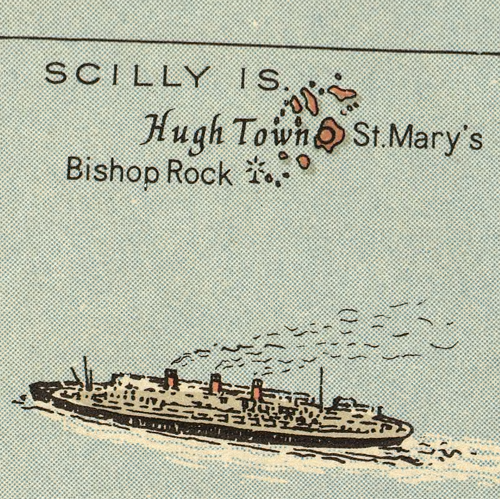By Anne Corlett.
 These islands just off the coast of Cornwall are part of England, but they do have their own genealogical challenges. The census and civil registration records are part of the England and Wales data sets, and can be viewed online at any site that holds these sources. The island’s parish registers are available through FamilySearch and on various other websites, with links on the Scilly Genuki page (tinyurl.com/oblbywl). Unfortunately, the registers only date back to 1726, as the earlier records were destroyed by fire.
These islands just off the coast of Cornwall are part of England, but they do have their own genealogical challenges. The census and civil registration records are part of the England and Wales data sets, and can be viewed online at any site that holds these sources. The island’s parish registers are available through FamilySearch and on various other websites, with links on the Scilly Genuki page (tinyurl.com/oblbywl). Unfortunately, the registers only date back to 1726, as the earlier records were destroyed by fire.
For probate records after 1858 you can search online at the government’s central probate site (probatesearch.service.gov.uk/#wills), and for pre-1858 wills you will need to look at the records of the Court of the Bishop (Consistory) of the Archdeaconry of Cornwall. There is also an Online Parish Clerk site for the islands (tinyurl.com/pdh3euj), and this includes old photos and some family trees for island families. Scilly comes under the Cornwall Family History Society (www.cornwallfhs.com) but additional information about family history for the islands can be found at tinyurl.com/nawtuef. The Isles of Scilly Museum (www.iosmuseum.org) also has an interesting oral history archive, and this is now being put online at the Scilly Voices website (www.hrionline.ac.uk/scillyvoices).
There is little material available for early Scillonian ancestors, but if you are lucky you may find references to your forebears in A Survey of the Scilly Islands, by John Troutbeck, a 1796 publication now available on Google Books. If you enter the title and author’s name into Google, you should find a link that will take you straight to the relevant book. Another very useful publication is the Devon and Cornwall Record Society’s version of The Parliamentary Survey of the Duchy of Cornwall, Part II, edited by Norman Pounds. The survey took place in 1652 following the surrender of the last royalist forces garrisoned on Scilly, and it lists the residents of the island, together with rental information. This is probably the most useful genealogical resource for the 17th century, since the 1641 protestation returns for the islands have not survived.
Researchers should also be aware that some Scillonians may have lived their whole lives on the more remote islands without ever featuring in official records. The Isles of Scilly have a fascinating history, but genealogical information is extremely patchy. Be aware of the challenges involved, and view any information as a bonus.
Royalist relatives
The Scilly Isles were a Royalist stronghold during the last years of the civil war. If any of your Cornish forebears were royalists, it might be worth entering their names into Google, along with search terms such as ‘royalist’ and ‘Scilly’ to see if there’s any evidence that they were part of the garrison on St Mary’s.
